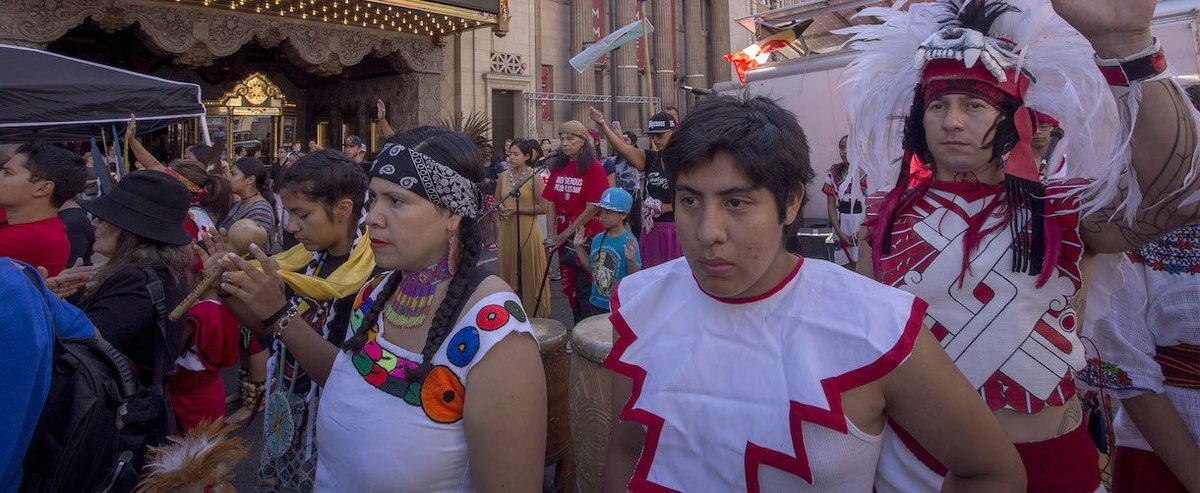Indigenous Peoples’ Day has been celebrated on the second Monday in October in cities and states across the U.S. since 1992. The day originally was created as a protest against Columbus Day, and as a result most states and cities recognize it on the same day — the second Monday in October. YouGov conducted a nationally representative survey gathering American adults’ thoughts about the role of Indigenous people in U.S. history and the celebration of Indigenous Peoples’ Day. Many Americans approve of celebrating such a day and of its federal observance, but fewer approve of its place on the calendar. And most have little familiarity with it.
Indigenous people’s place in American history
The vast majority of Americans consider Indigenous people to be important to the history of the United States — including 54% who say they are very important to American history. Older Americans are especially likely to view Indigenous people as very important: 60% of those 45 and older do, compared to 47% of younger adults. Democrats are slightly more likely to view Indigenous people as very important to U.S. history (64%) than are Independents (49%) and Republicans (50%). But strong majorities in all three groups view Indigenous people as important to history (90%, 82%, and 86%, respectively).
In addition to believing that Indigenous people have been historically important, most Americans view Indigenous people as having made mostly positive contributions to the U.S. A majority of Americans (56%) believe Indigenous people have had a mostly or completely positive impact on the U.S., while only 5% believe their impact has been mostly or completely negative. This attitude is held by majorities of all major age groups, although older Americans are more likely to see Indigenous people’s impact as both positive and negative than younger Americans — 35% of those 65 and older, compared to 23% of adults under 30. There is a greater divide on this question across political lines. While 70% of Democrats view Indigenous people’s impact as mostly or completely positive, only 48% of Republicans feel the same way. Republicans are much more likely than Democrats to view Indigenous people’s impact as both positive and negative (38% vs. 20%). However, those who think Indigenous people had a mostly or completely negative impact make up a small minority of both groups: 8% of Republicans and 4% of Democrats.
Views on Indigenous Peoples’ Day
Even though Indigenous Peoples’ Day is observed by many states and has received presidential recognition for several years, most Americans have little familiarity with it. A majority of Americans (55%) say they are not very familiar with the holiday or haven’t heard of it.
Familiarity is higher among younger Americans. A majority (59%) of adults under 45 are somewhat or very familiar with Indigenous Peoples’ Day compared to 34% of older Americans. Familiarity is also higher among Democrats (59% very or somewhat familiar) than Independents (42%) and Republicans (34%).
Living in states that officially observe Indigenous Peoples’ Day doesn't correspond with greater familiarity with the holiday. Nearly half (47%) of Americans living in the 15 states and Washington, DC, that recognize Indigenous Peoples’ Day are somewhat or very familiar with the holiday — only slightly higher than the 42% of Americans in the 3 states that have a holiday recognizing Indigenous people with a different name, such as South Dakota’s Native American Day or Hawaii’s Discoverers’ Day, or the 44% of people in the 32 states that don’t have a holiday recognizing Indigenous people at all.
Even though most Americans don’t know much about Indigenous Peoples’ Day, a majority (54%) somewhat or strongly approve of celebrating the holiday. Most Americans who didn’t express outright approval say they neither approve nor disapprove (31%) or are not sure (10%). Only 5% of Americans express somewhat or strong disapproval.
Approval is highest among the youngest group of American adults (63% of those under 30) and lowest among the oldest (43% of those 65 and older). Support is higher among Democrats than Republicans (72% vs. 40%). Like with familiarity of Indigenous Peoples’ Day, approval does not significantly differ between states that do and do not officially recognize the holiday.
A majority of Americans (63%) believe Indigenous Peoples’ Day — or a day like it — should be recognized by the federal government. While a federal day for the country's Indigenous peoples is particularly popular among young adults (70% of those under 30) and Democrats (76%), it also is supported by majorities of Independents, Republicans, and Americans of all age groups.
However, Americans are more split on what federal recognition of a day for Indigenous peoples should look like. Respondents were asked, “do you think the federal government should have a day recognizing the Indigenous peoples of the United States?” and were offered the options, “yes, a federal holiday for which government workers get a day off (similar to Labor Day or Martin Luther King Day),” “yes, a national observance for which government workers do not get a day off (similar to Mother's Day or Flag Day),” “no,” and “not sure.” The most popular preference among Americans is to have a federal holiday recognizing Indigenous peoples (36%), but support for a national observance is close behind (27%). Americans 65 and over are more likely to support a national observance (34% vs. 21%), as are Republicans (29% vs. 24%). However, it’s unclear whether this is because members of these groups are less likely to see a day recognizing Indigenous peoples as important, or because they are more likely to oppose a day off for federal government workers.
Americans who believe the government should have a day recognizing Indigenous peoples are split on when that day should be. Most Americans who support a day recognizing Indigenous peoples think it should take place on a different day than Columbus Day. While 19% of Americans believe a day celebrating Indigenous peoples should take place on the day that Columbus Day is currently held, 35% believe it should be celebrated on a different day. Holding it on the same day that Columbus Day is currently held is more popular among young adults and Democrats and less popular among older Americans and Republicans, but among all age groups and political identifications, support for a separate day is higher than for the same day.
While Americans are more in favor of separating a day recognizing Indigenous peoples from Columbus Day, this should not be taken as a sign that Columbus Day is the more widely supported holiday. While a majority of Americans believe the federal government should have a day recognizing Indigenous peoples (63%), only about half (49%) support a day recognizing Christopher Columbus. Opposition to any form of a federal day recognizing Columbus (31%) is also higher than opposition to a day recognizing Indigenous peoples (15%).
And while a majority of Americans approve of celebrating Indigenous Peoples’ Day (54%), approval of Columbus Day is lower (44%). Conversely, while about a quarter (23%) of Americans disapprove of celebrating Columbus Day, disapproval of Indigenous Peoples’ Day is much less common (5%).
Related:
- Christopher Columbus and Columbus Day divide Americans
- Has Leif Erikson Come Out of Christopher Columbus' Shadow?
See the results for this YouGov poll
Methodology: This YouGov poll was conducted online on October 4 - 6, 2024 among 1,137 U.S. adult citizens. Respondents were selected from YouGov’s opt-in panel to be representative of adult U.S. citizens. The sample was weighted according to gender, age, race, education, 2020 election turnout and presidential vote, baseline party identification, and current voter registration status. Demographic weighting targets come from the 2019 American Community Survey. Baseline party identification is the respondent’s most recent answer given prior to November 1, 2022, and is weighted to the estimated distribution at that time (33% Democratic, 31% Republican). The margin of error for the overall sample is approximately 4%.
Image: Getty











